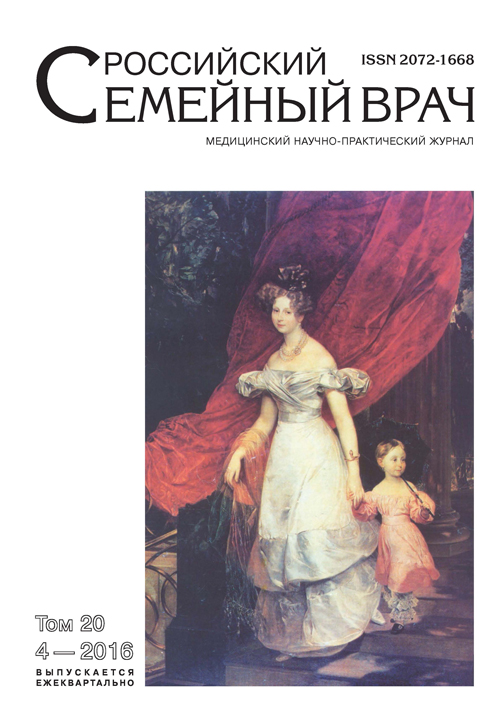Vol 20, No 4 (2016)
- Year: 2016
- Articles: 6
- URL: https://journals.eco-vector.com/RFD/issue/view/355
- DOI: https://doi.org/10.17816/RFD20164
Articles
OBESITY: DIAGNOSIS AND TREATMENT IN GENERAL PRACTICE
Abstract
The lecture presents contemporary view of obesity as a chronic cardiovascular disease with a complex pathogenesis and unknown etiology, with severe economic and social consequences; on the role of eating behavior in the development of obesity and the need for psychological correction in the complex of therapeutic measures for this disease. Author describes the complex of diagnostic procedures for the examination of the patient with obesity. The rationale for an integrated approach to therapy including low-calorie diet, physical exercises and correction of eating behavior is presented.
Russian Family Doctor. 2016;20(4):5-25
 5-25
5-25


 26-34
26-34


Correction of gastrointestinal microbiocenosis and nutritional status in patients with metabolic syndrome and intestinal dysbiosis of individually selected probiotics
Abstract
The article presents the study of the evaluation of the correction of intestinal microbiocenosis and nutritional status disorders in patients with metabolic syndrome and intestinal dysbiosis after treatment with individually selected probiotics and probiotic foods. The study involved 117 patients with metabolic syndrome and intestinal dysbiosis 1-2 degrees, living in the therapeutic area. 3 observation groups were formed. The main criteria for assigning patients to different groups of observations were the difference in adhesion, biocompatibility and the degree of antagonism of microorganisms isolated in the faeces. Results of the correction of intestinal microbiocenosis of patients were evaluated for microbiological indicators faeces, correction of nutritional status - in terms of body composition, blood lipids and glucose profiles. Treatment with individually selected probiotics with high adhesion and antagonism, not suppress indigenous lactobacilli and bifidobacteria in the background contributed to the hypocaloric diet correction microbiological parameters in the feces, body composition and biochemical indicators of lipid and carbohydrate spectrum of the blood of patients.
Russian Family Doctor. 2016;20(4):35-38
 35-38
35-38


CESAREAN SECTION AS A FACTOR OF PREVENTION OF VERTICAL TRANSMISSION OF HEPATITIS C
Abstract
Hepatitis C virus transmission from mother-to-child is the main cause of infection of children. As a result of vertical transmission of HCV in the world every year between 10 000 and 60 000 newborn are newly infected. The question of the mode of delivery of pregnant infected women with the hepatitis C virus remains controversial and open. Regardless of the level of viral load and the presence of hepatitis B virus infection of the placenta C violations transplacental protective placental barrier in pregnant women with chronic hepatitis C do not develop.
Russian Family Doctor. 2016;20(4):39-44
 39-44
39-44


ANNIVERSARY CONFERENCE OF DEPARTMENT OF FAMILY MEDICINE. CHRONICLE OF EVENT
Abstract
The article is dedicated to information about All-Russian Conference with international participation “Clinical guidelines as a basis for GP clinical practice” which was organized at 3rd-4th October and devoted to 20-year anniversary of department of family medicine of North-Western State Medical University named after I.I. Mechnikov. There are presented summaries of reports that were included to the forum’s program.
Russian Family Doctor. 2016;20(4):45-53
 45-53
45-53


A CONTINUED INTERNATIONAL PARTERNSHIP IN FAMILY MEDICINE
Abstract
The Department of Family Medicine of University of Iowa has a long and collaborative relationship with the Department of Family Medicine of North-Western State Medical University named after I.I. Mechnikov that started over 20 years ago. Relationships like these are very valuable for resident education and continued professional development. In October, 2016 3 attending physicians and 1 resident (the author of this article) were able to visit St. Petersburg to participate in a conference and visit the department. I stayed for an additional two weeks as part of my residency training to participate in clinical, academic and research activities. Below is an outline of the educational and training requirements for doctors of family medicine in the US, comments on the conference, a brief summary of a new research project with investigators from both sites and other details of my experience in Russia.
Russian Family Doctor. 2016;20(4):54-58
 54-58
54-58












